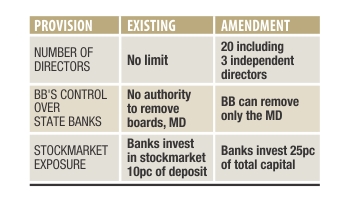BB gains some control over state banks

Parliament passes new banking companies law
The government has finally empowered Bangladesh Bank to remove any chief executive officer of state banks to prevent activities harmful to depositors.
However, the authority to remove the chairmen and directors of the banks remains at the hands of the government.
The changes came in the Banking Companies (Amendment) Bill, which was passed in parliament yesterday. Under the existing law, only the government can take actions against the chief executives of the state banks.
The amendment was made under the conditions of the Extended Credit Facility loans of the International Monetary Fund.
The IMF had recommended the central bank should have the authority to remove the boards of the state banks, like the private banks.
Presently, if the boards or higher management of the state banks are involved in fraudulent activities, the BB can only advise the government on what to do, but cannot take any action.
Before various scams were unearthed in different state banks, the BB had sent letters to the government several times, urging it to take action against the boards of the banks, but the government had not taken any action.
In this context, the IMF had recommended empowering the central bank with the authority to take actions against the state banks, their boards and other higher authorities.
According to the amendment, banks’ exposure to the capital market has been lowered to 25 percent of their total regulatory capital. The existing law allows banks to invest 10 percent of their deposits in the stockmarket.
Besides, according to the amendment, if any bank purchases shares of other companies it will not be more than 5 percent of the bank’s paid-up and reserved capital.
The number of directors at any bank will not exceed 20 including three independent directors, the amendment says. If the number of directors is less than 20 in any bank, the number of independent directors will be 2.
However, the number of directors has to be brought down to the limit one year after the amendment comes into effect.
The independent directors will be appointed within three years after the act takes effect. Before appointing them, permission has to be taken from Bangladesh Securities and Exchange Commission.
Though the existing law does not specify the number of directors, the finance ministry had earlier tried on several occasions to bring down the number to 15.
The amendment also brings stringent measures to curb frauds in fund collection from people in the name of deposits.
If any non-bank organisation collects deposits from the public, it will have to take approval from the central bank, according to the amendment.
The BB will also monitor the activities of these organisations and take punitive measures against them if any irregularity is detected.
According to sections 4 and 121 of the act, the government has the power to exempt any particular bank from the purview of the act after consultation with the BB.
According to section 31 of the existing act, the central bank may cancel licence of any bank on charges of irregularities. But if the bank’s owner appeals to the government, then it is the government that will take the final decision.
But the amendment took away the power from the government and gave it to the central bank.




Comments